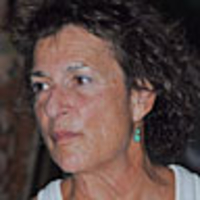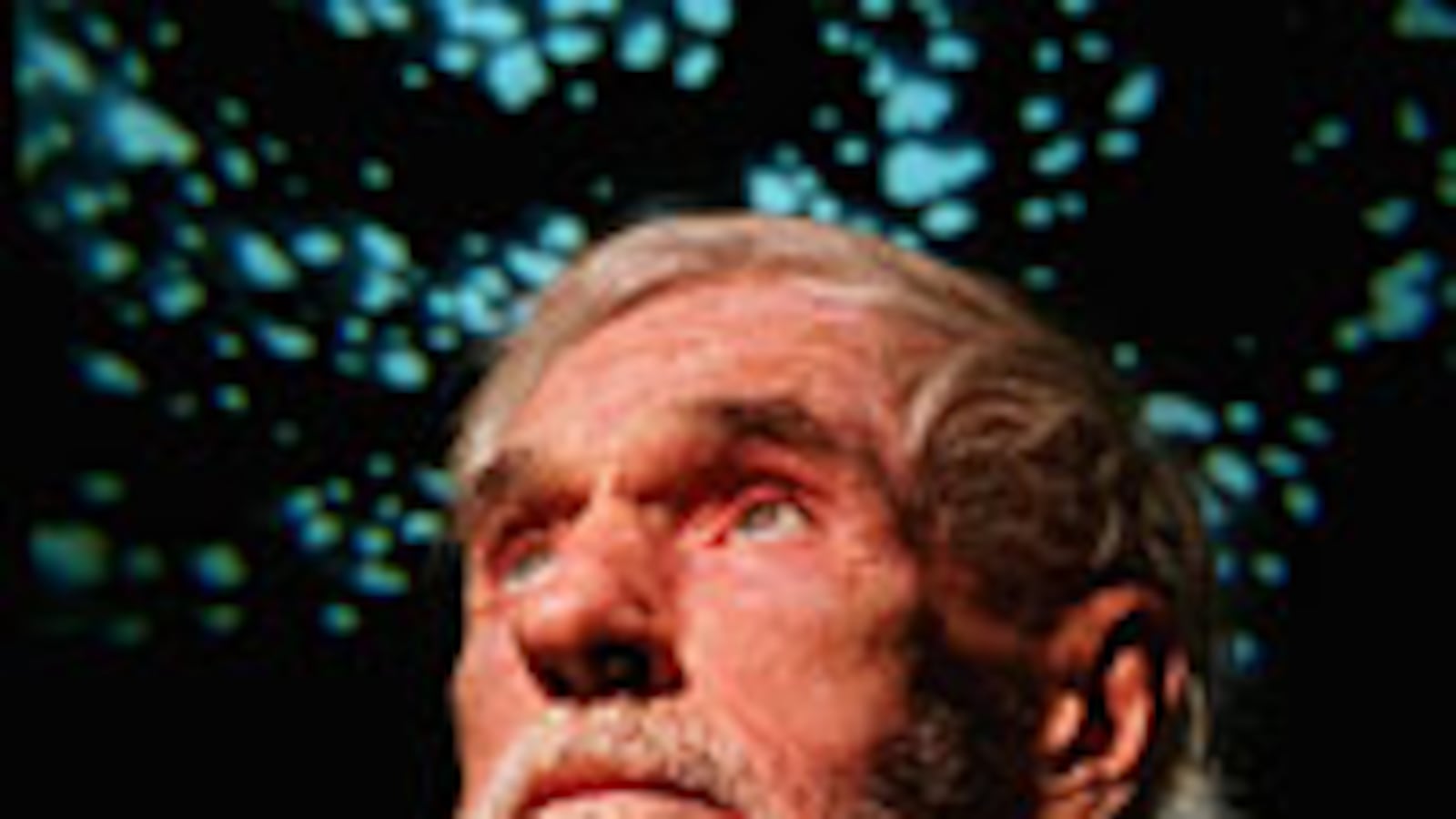
Timothy Leary died in 1996, but to his devotees, he's been circling around out there, just waiting to tune back in.
That moment arrived at a reunion party for Leary last week in San Francisco's 111 Minna Gallery. For the 300 or so party guests, Leary remains a magnet. The gathering looked like a tie-dyed retrospective of family members, freaks, former acid kingpins, vintage-clad rockers and alternative-press types like Zap Comix publisher Ron Turner and Dr. Hip, aka Gene Schoenfeld.
Susan Sarandon, Tim Robbins, and Leary’s goddaughter Winona Ryder were among the loyalists who insisted Leary’s snitching in the face of 99 years on various charges was understandable.
While there, I cornered a tall, rangy, pony-tailed man, Michael Randall, whose leather cowboy hat and weathered looks lent him a certain outlaw charisma. "I am a founder of the BEL and am considered the leader," he said, referring to the Brotherhood of Eternal Love, the LSD consortium of Laguna Beach surfers who founded their "spiritual charity" with Leary as inspirer. After Leary was fired from Harvard and, in 1970, sentenced to 10 years in prison for possession of a small amount of hashish, BEL footed the bill for his jailbreak, an audacious escape down a drainpipe just four months into his sentence. The story behind the sensational news at the time was first related to me by Leary’s ex-wife, Rosemary, in interviews in 2001, a year before her death.
As Rosemary told it, four members of the Weather Underground, the revolutionary group that bombed the Capitol building in ‘71, provided fake passports and airplane tickets to both her and Leary following the escape. The pair fled to Algeria, and found sanctuary in the compound of the International Wing of the Black Panthers. Panther leader Eldridge Cleaver, himself a fugitive from justice, soon grew exasperated with Leary, an irrepressible socialite, for hanging out in town with Eurotrash. Cleaver placed both Learys under "house arrest,” an early sign of trouble in the brief marriage between the two strands of the counterculture—the revolutionaries and the drug-taking hippies.
The jailbreak cost BEL $40,000 total, with $25,000 going to the Weathermen alone, said Randall. This included $15,000 sent to the Learys by courier for their expenses after fleeing, and later $10,000 more to give to Cleaver, who promptly released them. Leary was captured more than a year later in Afghanistan, his marriage to Rosemary in shambles, and extradited back to federal prison, where he began snitching on Rosemary, BEL, his attorney, and the Weathermen.
Randall also confirmed that Weather Underground member Bernardine Dohrn and her husband Bill Ayres—the very same "terrorist" used to smear Barack Obama during the campaign—drove one of two getaway cars in relay, spiriting Leary to Seattle and then, with Rosemary joining him, to Chicago.
"I was pissed at Tim, but I loved him," Randall said of Leary's snitching. Years later at a gathering, he says he confronted Leary: "I said, 'Why did you do it? You betrayed everything we and you ever stood for.'" Leary argued, "''No one ever served a day in jail because of me.'" But Randall believed Rosemary was victimized.
Others felt differently. When The Smoking Gun website published his grand jury transcripts in 1999, three years after Leary's death, no less than Susan Sarandon, Tim Robbins, and Leary’s goddaughter Winona Ryder (her mother and father, old friends of Leary’s, were at the reunion), were among the loyalists who insisted Leary's snitching in the face of 99 years on various charges was understandable.
But Rosemary, who was a fugitive living underground in a hardscrabble life for 24 long years, was angry, believing she couldn't surface without being pressured to corroborate Leary's testimony. "I am not a snitch," she said during the interview we had the year before she died. She still faced charges of possession of hash and jumping bail. When Leary's daughter, Susan, committed suicide in 1990, Rosemary called her ex in sympathy. Later, after charges were dropped, she resurfaced. In the end, she too forgave him, taking care of a dying Leary.
In life and in death, Leary was a phenomenon: Harvard professor, psychologist at Kaiser Hospital in Oakland, and seducer of youth—or at least their inheritances, like the 2,400-acre Millbrook estate of the Hitchcock twins, whose 64-room mansion was requisitioned in the mid-‘60s for weekend acid trips Leary put on for the hip and the famous. His guests were the elite class, like Henry and Clare Booth Luce, and the arty, like artist Saul Steinberg, director Otto Preminger, Charlie Mingus, and counterculture heroes Allen Ginsberg, Paul Krassner, William Burroughs, and Ken Kesey. These parties flourished until crusading Dutchess County prosecutor, none other than G. Gordon Liddy, Watergate burglar-in-chief, raided Millbrook and arrested Leary and Rosemary, ending the fun.
Leary’s personality was perfectly suited to such gatherings. Last week’s party, according to Denis Berry, a trustee of Leary's archives who hosted the event, was in part to publicize the collection for sale—letters, speeches, videos, tapes, memorabilia, even a plaster cast of Leary’s face—and in part to unite various family factions and friends, some still quarreling over the man and his legacy. The event featured the premiere of The Terrestrials, a documentary of the effect of Leary on UC Santa Cruz students as they digitized his tapes and videos.
In one of his last incarnations, Leary, free at last, and married to his fifth and final wife, Barbara, sister of actress Tanya Roberts, became a fixture on the Tinseltown dinner circuit—a sellout to some, like his son Jack.
At the reunion, Jack, now 59 and white-haired, told me his estrangement from Tim was "complicated," but denied it was the wild Millbrook scene that prompted his leaving home at the age of 17. It was the snitching he hated. He appeared condescending about his father's need for attention. "Tim never wanted to be a guru," he told me. "He wanted to be a rock star, a Mick Jagger, but he couldn't play the guitar." He mocked his father as a socialite: "He and his wife would come home after an evening out and spend hours obsessing over their social standing—whether they got seated at the right table or not."
Still, later that night, hugging many old friends of his father, including Randall and famed LSD chemist Nick Sand (who still to this day takes acid once a month, and was recovering from a heart attack a scant two weeks previously), introducing for the first time his children to Susan's, and posing for pictures with his sisters' two daughters, Jack seemed happy to be back in the Leary fold, and to meet his stepbrother, Zach Leary, Barbara's son, whom Leary legally adopted. Zach chose to live with Leary. "I think Tim was better later," Jack mused—a better father to Zach, and grandfather to his sisters' three children. (Susan's son was absent.)
Leary's last six months after he was diagnosed with prostate cancer was a coda to his life. He announced he'd freeze himself with a cryonics firm. It fit with his futurist notions. But unable to afford the cost of 50 years of refrigeration, he opted for the cut-rate freezing of his head only. Both Berry and Joey Cavello, Leary's video guy who recorded everything Leary in his later years, including his demise, said the freezing idea was too much, even for Leary. When the cryonics team came with hospital bed, basins and equipment (saws to cut off his head in the minutes after he died), Leary sent them packing, telling Cavello he didn't want to wake up to face humorless guys in white coats with clipboards—and it was gruesome.
Berry says he privately thought the cryonics and subsequent Leary plans to have his ashes go into space along with Star Trek author Gene Roddenberry's were manifestations of Leary's submerged fears of death.
But that's not how Joichi Ito, a Japanese businessman Leary first met in the 1980s, sees it. Ito was accompanied at the party by four men in identical black suits who looked wildly out of place in the hippie-garbed crowd. But Ito has long been a counterculturist in his native Japan (currently he resides in Dubai) He’s been a DJ, club owner, rave importer, Internet geek, and Leary admirer, as he put it to me. Ito, another Leary godchild, told of flying in when he heard his dear friend was about to die. "I saw him the night before he died. Tony Scott, the director, was there. Leary was smoking cigars and snorting cocaine," he laughed. “So I thought, he's fine, and I left. He died the next day. I had to fly right back for the memorial."
In the end, the reunion didn’t settle the question of whether Leary was a snitch or a visionary. But after all the stories I heard that evening, it was clear to me that even in death, Leary was good company.
Kate Coleman is a freelance journalist residing in Berkeley.






